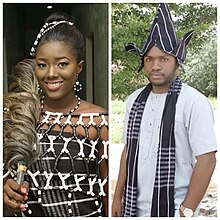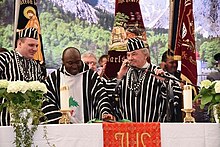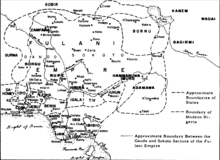Tiv people










Abo Tiv (gbaki Tiiv)[1] chi abo Tivoid ethnic group ma ché. Abo Tiv dabi 5% amone kù ma dí Nigeria chakadu, Ma dabi amone mí Òdulugwu mégwélu ojane Nigeria kpai Cameroon.[2] Abo kù ma kí ichi Tiv ojane Nigeria díBenue, Taraba, Nasarawa, Plateau, Cross rivers, Adamawa, Kaduna, kpaí Abuja States. Ichi Tiv chi branch Benue–Congo kpaí Niger–Congo phylum. Egba igbele kí amí enéfu ma wa colonise abo Nigeria tañ amí Fulani chi amí "Munchi" ma dí abo Tiv.
Ola Igbélé
[nwọ́che | nwó étéwn che]
Abo Tiv ka kí ní Southeast ma gwò ka kí má jí ugbo kù ma jò abajio í.[3] Ugbo kù ma lé ka kù ma ji ojéwo kù ma jò abajio chí southern, ma ñwo ka kí ní ma lí south-central manyí west-central Africa ka kù ma wi ane savannah West African Sudan, ugbo kù ma lé wò ómò chi River Congo kpaí amí ojuwo Cameroon ka kù ma Swemkaragbe Cameron Efewo lé dí iba Nigeria, eko kù ma wi éwo lé chi ú chané 1500 CE.[3] Eko kù ma ka kí ni ma na wí Nigeria, ma ché kpatuka. ugbo ku ma lé kù ma ka chí.. méní abo ka lí south ówò ojuwo Obudu, abo ka la lí north éjù owo Mdema kpaí Waka district, abo kí bo lotí benue eju owo core central Nigeria. U lé chakadu kù ma lé chi egba u chané 1500 CE a tí 1600 CE, ma lé í. Ami Tiv chane dama kpai ami ichi ki bo Nigeria. Abo Tiv ma ni Onu e nwu ku ma ne egba le chi ami aboji ofe igbeli, odu ku ma do ma chi "Orya". Ami enefu ku ma kwi Europ ma yika ma man todu ku ma ma ni onu egbale todu ami enefu le chi ami onu ma cha nweju achukolo kpai ama. Eko ki am enefu li abo Tiv chi egba 18th century, ugbo ku ma du li ma chi Iba aji. Benue River, egba le o nwu ami enefu ka nwu ma ka ki ni i che nyo ku ma no onu odo 1940.[4]
Eko kù ma dama kpaí amone
[nwọ́che | nwó étéwn che]Ami Tiv chakadu ka ki ni olopu ugbo ku ma kwo chi Ichongo[5] kpai Ipusu[5]. Ichongo kpai Ipusu che kpe ri ami olopu keke ke, olopu ki che nya tule efu ma chi ipaven.[6] Abo ipaven a dodo dama odu ewo ma la chi "tar".[7]
Icholo
[nwọ́che | nwó étéwn che]Ugbo (A'nger)
[nwọ́che | nwó étéwn che]Color ukpo abo Tiv chi edudu kpai efufu
Ami ukpo ki bo ku na nyi chi
Ivvavtyo, Lishi, Gbev-whaa, Godo, Tugudu, Chado, Deremen, Gbagir.
Ujenwu
[nwọ́che | nwó étéwn che]Odu ami ujenwu ma chi ruam kumen (pounded yam), ruam nahan (turned food), akuto (sweet potato pottage), choko (dafa), akpukpa, etc.
Obo
ami odu obo ma chi pocho, ager, genger, atyever, tur, vambe, igyo, agbende a ashwe, mngishim, ashwe, Atuur, vegetables, ijôv, aninge, furum, adenger, gbungu, angahar a ikyuna, gbande.
Ujenwu abo Tiv
Uchu ero,
oscapa kpai egwa
Ote ma chi
burukutu,
ibyer
Snacks
Igogo
, odumu okpa ku ma ro, ibo,akala, opa ku ma no
- Tiv cultural dishes[citation needed]
-
Oje Uchu kpaí obo
-
Burukutu
-
Opa kpaí igogo
-
Ibyer
-
kyegh sha ishwa
-
Mzembe or pears
-
Uchu ero
Iya chi
[nwọ́che | nwó étéwn che]Alu ki abo Tiv a chí iya chí drama ma chí Kwagh-hir.[8]
- Kyoive
Ugbo ku ma jò
[nwọ́che | nwó étéwn che]Benue state
[nwọ́che | nwó étéwn che]Ugbo ki ami Tiv jó Benue chí
Tarkaa, Makurdi, Gwer East, Gwer west, Ukum, Logo, Konshisha, Gboko, Kwande, Vandeikya, Katsina Ala, Guma, Buruku, and Ushongo
Nassarawa state
[nwọ́che | nwó étéwn che]Ugbo ku ma dodo Benue state chí
Doma, Nasarawa, Lafia, Obi, Keana, manyi Awe Local Government Areas
Plateau state
[nwọ́che | nwó étéwn che]Ugbo ku ma dodo plateau state chi
Qua’an Pan manyi Shendam Local Government Areas
Taraba state
[nwọ́che | nwó étéwn che]Bali, Donga, Ibi, Gassol, Takum, Gashaka, Kurmi manyi Wukari Local Government Areas
Cross River state
[nwọ́che | nwó étéwn che]Yala, Bekwara, Obudu, manyi Obanliku Local Government Areas. [9]
Cameroon
[nwọ́che | nwó étéwn che]Ami akwora unyi amone kí chí Tiv kí dí cameron ti 1700 lé amone chakadu ku na ki ichi Tiv tí 11,000 lé ugbo ku na jo chí south-western border kí dí Cameroon, Manyu division, north east Akwaya ugbo boarder ugboji Nigeria. Onu ma chí Zaki Abaajul, abo kí chī aboji ñwu ma chí abo Tiv manyi Ulitsi. Abo ichi Tiv kù ma dí Cameroni cha nyí unyi ukoche nyo’yo, éjòwò ugbo kù ma jò ojí lé chí éjòwò ugbo kù ma kí anglophone[10] Uche Kpaí ukólò government amí Tiv Cameron a gbeju ché í.[citation needed] [11]
Abo ogbogaga Kí dí Ane Tiv
[nwọ́che | nwó étéwn che]


Abo kù ma chi ukólò Ijabe
- Joseph Tarka
- Barnabas Gemade
- Aper Aku
- George Akume
- Iyorchia Ayu,
- Prof. Ignatius Akaayar Ayua, SAN, OFR, FNIALS,
- Chaha Biam
- Gabriel Suswa
- Samuel Ortom
- James Ayatse
- Daniel Saror
- Michael Aondoakaa
- Moses Adasu
- A.I. Katsina Alu
- Iyorwuese Hagher,
- Yima Sen, radical political activist
Abo kù ma chi Ukólò soja
[nwọ́che | nwó étéwn che]- Gideon Orkar
- Victor Malu, Chief of Army Staff akwobi
- Joseph Akahan, Chief of Army Staff Nigeria ejodudu
- Joseph Akaagerger, Governor Kastina Igbele
- John Mark Inienger, agboji ECOMOG commander igbele
- Farida Waziri, aboji EFCC igbele
- John Kpera, governor soja Anambra state.
- General Gabriel Kpamber, aboji ECOMOG commander igbele
Abo sportu
[nwọ́che | nwó étéwn che]- Terna Suswam, ené kí ya dí ball
- Dominic Iorfa Sr,ené kí ya dí ball
- Dominic Iorfa Jr ené kí ya dí ball
- Timothy Anjembe, ené kí ya dí ball
- David Tyavkase, ené kí ya dí ball
- Jeff Varem, NBA D-league player
- Terna Nande, ené kí ya dí ball America
- Apollo Crews, WWE ené kí ya juja
- Francisca Ordega, ené kí ya dí ball
- Fanendo Adi
- Barnabas Imenger Jr., ené kí ya dí ball
- Russel "Russwole" Orhii, World Champion Powerlifter
- ↑ Duggan, E. de C. (1932). "Notes on the Munshi ('Tivi') Tribe of Northern Nigeria: Some Historical Outlines". Journal of the Royal African Society. 31 (123): 173–182. doi:10.1093/oxfordjournals.afraf.a101094. JSTOR 716707.
- ↑ Emmy and Shamiga Dominic, Itx (January 2019). "The History of the TIV People Published by Agula Terdoo Emmanuel". What's Next for Computer Science in the Coming Decades?.
- ↑ 3.0 3.1 Mark Cartwright (11 April 2019). "Bantu Migration". World History Encyclopedia.
- ↑ "Benue River - Knowledge Encyclopedia".
- ↑ 5.0 5.1 "Tiv Genealogy – Tiv Nation" (in American English). Retrieved 2022-09-03.
- ↑ Asante, Molefi Kete; Mazama, Ama (2008-11-26). Encyclopedia of African Religion (in English). SAGE Publications. p. 915. ISBN 9781506317861.
- ↑ Middleton, John; Tait, David (2013-11-05). Tribes Without Rulers: Studies in African Segmentary Systems (in English). Routledge. p. 40. ISBN 9781136532139.
- ↑ Ikyer, Godwin Aondofa (2016). "The Tiv Typology". Matatu. 48 (2): 309–334. doi:10.1163/18757421-04802006.
- ↑ Project, Joshua. "Tiv in Nigeria". joshuaproject.net (in English). Retrieved 2021-07-26.
- ↑ "Definition of ANGLOPHONE". www.merriam-webster.com (in English). Retrieved 2022-08-30.
- ↑ "Tiv | Joshua Project". www.joshuaproject.net. Retrieved 2021-07-26.
Further reading
[nwọ́che | nwó étéwn che]- Abraham, R.C. (1933) The Tiv People, Lagos.
- Anifowose, R. (1982) Violence and Politics in Nigeria: The Tiv and the Yoruba Experience, New York: NOK.
- Arinze, F. (1990) Africans and Christianity. Ejiofor, Rev. L. ed. Nsukka: Optimal Computer Solutions Ltd.
- Ayoade, J.A. Agbaje, A.A. eds. (1989) African Traditional Political Thought and Institutions. Lagos: Centre for Black and African Arts and Civilization (CBAAC).
- Bohannan, Paul J. & Laura (1953) The Tiv of Central Nigeria London: International African Institute, 1953.
- Bohannan, Laura (1952). "A Genealogical Charter". Africa: Journal of the International African Institute. 22 (4): 301–315. doi:10.2307/1156915. JSTOR 1156915. S2CID 145557791. Éwn malábó:ProQuest.
- David, T. ed. “Political Aspects of Tiv Social Organisation” in Tribe Without Rules. London: 1958.
- Dorward, David Craig (1969). "The Development of the British Colonial Administration among the Tiv, 1900-1949". African Affairs. 68 (273): 316–333. doi:10.1093/oxfordjournals.afraf.a095924. JSTOR 720655.
- Downes, R.M. The Tiv Tribe. Kaduna: Government Printer, 1933.
- East, R. ed. Akiga's Story. London: 1965.
- Ehusani, G.O. An Afro-Christian Vision “Ozovehe!.” Lanham, Maryland: University Press of America, 1991.
- Evans Pritchard, E.E. (1940). The Nuer. Oxford Univ. Press, New York.
- Gbor, Capt. J.W.T. Mdugh U Tiv Man Mnyer Ve Ken Benue. Zaria: Gaskiya Publishing Corporation, 1978.
- Hagher, I.H. The Tiv Kwagh-Hir. Ibadan: CBAAC, 1990.
- Ikenga-Metuh, E. Comparative Studies of African Traditional Religion. Onitsha: Imico Publishers, 1987.
- Ikima, O. ed. The Groundwork of Nigerian History. Ibadan: Heinemann Educational Books Nig Ltd. (for the Historical Society of Nigeria), 1980.
- Jibo, M. Tiv Politics Since 1959. Katsina-Ala: Mandate International Limited, 1993.
- Jibo, Mvendaga. Chieftaincy and Politics: The Tor Tiv in the Politics and Administration of Tivland. Frankfurt: Peter Lang AG, 2001. 325 pp. Europäische Hochschulschriften, Reihe 31: Politikwissenschaft Vol. 422 Éwn malábó:ISBN / US-Éwn malábó:ISBN pb.
- Makar, T. A History of Political Change among the Tiv in the 19th and 20th Century. Enugu: Forth Dimension Publishing Co. Ltd., 1994.
- Makar, T. Tiv People in Power Game in Nierian Politic Circa 1950–1983. Makurdi: Government Printer.
- Mbiti, J.S. African Religious and Philosophy. London: Heinemann Press, 1970.
- Middleton, J. & Tait, D. eds. (1958) Tribes Without Rulers: Studies in African Segmentary Systems, Routledge & Paul: London.
- Rubingh, E. (1969) Sons of Tiv. Grand Rapids: Baker House.
- Tseayo, J.I. Conflict and Incorporation in Nigeria: The Integration of the Tiv. Zaria: Gaskiya Corporation Limited, 1975.
- Vanguard Newspaper. Friday December 7, 2001.
- Vanguard Newspaper. Wednesday December 5, 2001.
- Bohannan, P. Africa. Vol. XXIV, No.1, 1954.
- Dorward, D.C. African Affairs. Vol. 68 No.273, London: 1969.
- Ewelu, I.B. West African Journal of Philosophical Studies. Vol.2, December 1999.
- Ikima, O. Journal of the Historical Society of Nigeria Vol. VII No. 1, 1973.
- http://www.everyculture.com/Africa-Middle-East/Tiv-History-and-Cultural-Relations.html#ixzz4x6ZfwkpM








